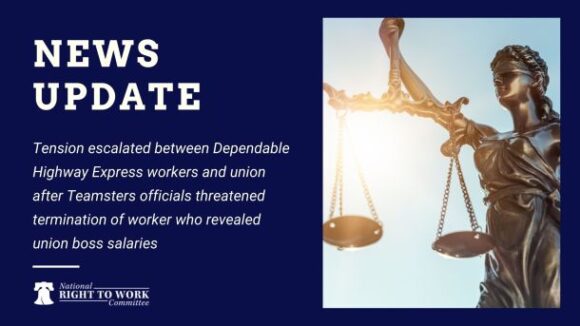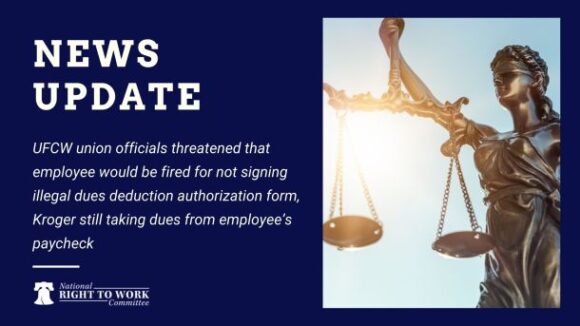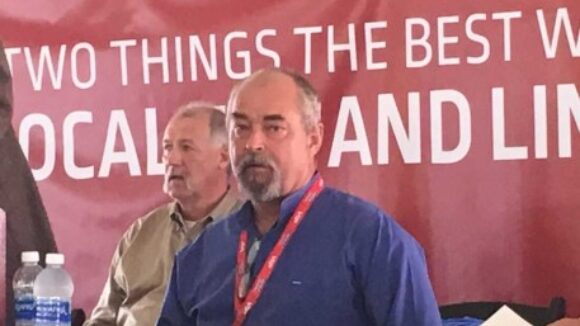Katie Packer takes a glimpse into the future should the Card Check Forced Unionism bill becomes law by looking at the tactics big labor has employed in West Virginia to force workers into a union.
Packer writes: One needs to look no further than the tactics employed in West Virginia by union bosses like Trumka to understand how damaging and dangerous it would be to provide Big Labor with increased political power and resources. If EFCA is enacted, the number of union members would increase significantly and as a result, union dues would flow. That means that in the first ten years, Big Labor bosses would have at least 35 billion additional dollars to spend on rewarding allies and punishing opponents.
If we use Big Labor’s past in West Virginia as a measuring stick, giving more power and control to people like Trumka should instill fear in many people’s hearts. Why? Well, just look at Trumka’s track record in West Virginia. Trumka led strikes that resulted in thousands of criminal violations all in the name of promoting his goals. Strikers committed violence, vandalism, destruction of property, serial intimidation, and endangered people’s lives. A strike captain even shot and killed a heavy-equipment operator who was working during the strike, leaving his wife and three children without a husband and father.
And if EFCA is enacted, Trumka would have the ability to wield his agenda and political power as he sees fit. This time, his outrageous and dangerous antics wouldn’t be confined to West Virginia; he would be able to perpetrate his definition of justice on small businesses and workers across the country.
But the troubling storyline with regard to Big Labor is not limited to Trumka. In fact, time and time again union bosses in West Virginia have used work stoppages or threatened them against various employers and industries to get what they want, however irrational. The Charleston Daily Mail actually addressed the matter in an editorial stating, “West Virginia state government spends oodles of money each year trying to attract new companies. Gov. Joe Manchin has declared the state is open for business. So why are union workers trying to slam the door shut by going on strike? Members of the United Steelworkers union, Local 37, at Steel of West Virginia in Huntington voted over the weekend 388-19 to turn down the company’s offer of a $2 per hour raise over four years … The products made in Huntington apparently can be made in Virginia and Indiana. If business is good, where will the company expand? If business is poor, where will the company lay off first? And what will other companies think of labor relations in the Mountain State? It does not help that, according to Bruce Groff, the plant’s vice president of administration, pickets have impeded traffic in and out of the plant. Union members have the right to vote to go from workers who averaged $18.86 an hour, plus a great health insurance plan, to unemployed steelworkers. And management has the right to keep the plant running to supply customers. No matter how this dispute plays out, West Virginia has suffered yet another setback in its never-ending quest to project to the world that the Mountain State is a good place to do business.”
In 2005, during a strike against the Ormet Corporation, one of the largest producers of primary aluminum in the country, at least 10 people were injured in multiple incidents of assault and harassment. In addition, dozens of cars had their tires slashed, windows shattered, or were otherwise damaged by labor bosses or their thugs.
Again, in 2000, in a strike against Coca Cola, violence ensued. This time, it wasn’t just intimidation and damaged vehicles. Coca Cola trucks were shot at early one morning.
In 1999, picketers who wore masks as they were striking against Century Aluminum threw rocks at people, injuring several individuals and damaging numerous vehicles.
And the examples go on and on.
All this speaks to the fact that West Virginia is a critically important state in the discussion concerning the Employee ‘Forced’ Choice Act not only because of its past, but also its future. If we allow labor bosses like Richard Trumka to intimidate and pressure Members of Congress into supporting legislation they know results in diminished freedoms and increased unemployment, it is increasingly likely that we will see incidents like those that took place in West Virginia occurring across the country.
Americans should expect their government to put in place policies that promote job creation and inclusion. EFCA would do just the opposite, by dividing employers and employees with massive job loss left in its wake.


